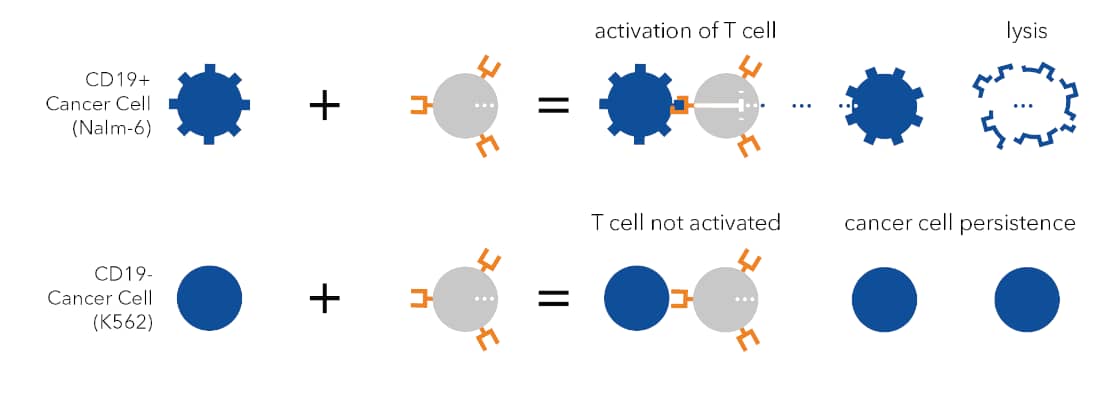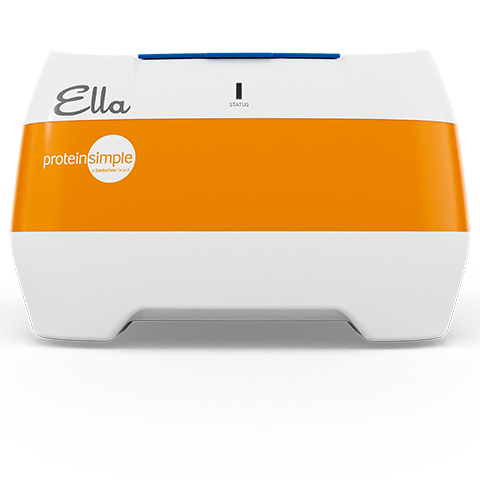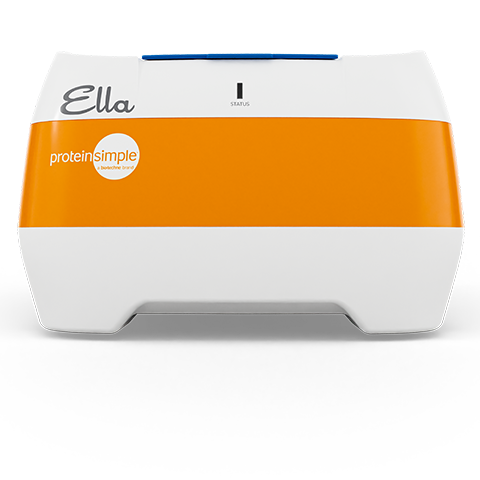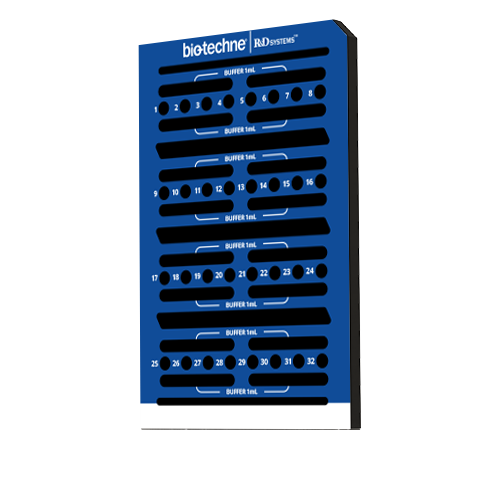Introduction
Although Chimeric Antigen Receptor (CAR) T cells have great therapeutic utility, the manufacturing workflow is complex and stringent regulatory requirements must be met. CAR T cells must be thoroughly characterized in vitro before infusion into the patient. Bio-Techne is pleased to offer Simple Plex T Cell activation marker assays to support cell therapy development and manufacturing scientists. Simple Plex assays on the Ella platform offer a rapid and precise assessment of secreted T cell activation markers to boost cell therapy development and manufacturing efficiency.
T Cell Activation Markers
In this application note, we use TcBuster™, Bio-Techne’s novel non-viral gene delivery technology, to generate CD19 CAR T cells and validate the use of Ella as a T Cell activation marker assay platform. Read on to learn more.

CD19 CAR T Cells Lyse CD19+ Cancer Cells Only
The first experiment was designed to test CD19 CAR T cell lysing efficacy. T cells were engineered to express anti-CD19 CAR using TcBuster™, a next-generation non-viral gene delivery system. CD19 CAR T cells were co-cultured with luciferase-expressing cancer cells that co-express CD19 (Nalm-6) or do not (K562). After 24 hours of co-culture, cell supernatants were combined with luciferin and assayed for luciferase expression. Cellular lysis was enhanced in the Nalm-6 co-culture but not the K562 co-culture. Lysis was equivalent to non-CD 19 transposed control T cells in the K562 culture. This data indicates that the anti-CD19 CAR expressing T cells lysed the CD19+Nalm-6 cells but not the CD19– K562 cells (FIGURE 1).

FIGURE 1. Cell Lysis was observed in NALM-6 co-cultures but not K562 co-cultures. CD19 T cells and Nalm-6 (A) or CD19 T cells and K562 (B) cancer cells were co-cultured at varying ratios (10:1, 5:1, 2.5:1, 1.25:1, 0.63:1, or 0.31:1) for 24 hours. Data were normalized to relative light units (RLUs) in the cancer cell-only wells. Bar graphs = mean ± SD (n=3), ****P<0.0001, **P< 0.01.
Simple Plex Assays Rapidly Quantify T Cell Activation Marker Secretion
Next, we wanted to assess T cell activation marker secretion. Anti-CD19 CAR expressing T cells were co-cultured with Nalm-6 or K562 cancer cells at a ratio of 5:1 for 24 hours. After co-culturing, supernatants were collected and centrifuged at 500 x g for 5 min to remove cell debris. Supernatants were assayed in 90 minutes using the following Simple Plex T Cell Marker assays: Granzyme B, TNF-α, IFN-γ, and IL-2. FIGURE 2 indicates that T cell marker secretion was robustly elevated relative to controls in the CD19 CAR T/Nalm-6 co-cultures only.

FIGURE 2. T cell activation markers are robustly elevated when CD19 CAR T cells are co-cultured with CD19+ Nalm-6 cancer cells. T cell activation markers Granzyme B, TNF-α, IFN-γ, and IL-2 were assayed in parallel using a 32x4 Multianalyte cartridge on the Ella platform. Bar graphs = mean ± SD (n=3).
Simple Plex Immunoassays Quantify Perforin Release in 90 Minutes
To evaluate Perforin secretion, supernatants from various ratios of Nalm-6 and K562 co-cultures were collected and analyzed using the Simple Plex Perforin assay. As seen in FIGURE 3, all CD19+/Nalm-6 co-culture supernates secreted more Perforin than control co-cultures. Only the highest (10:1) ratio CD19 CAR T cell/K562 secreted more Perforin relative to control co-cultures.

FIGURE 3. All Nalm-6 cocultures exhibited statistically significant increase in Perforin secretion. Bar graphs = mean ± SD (n=3), ****P<0.0001, **P< 0.01.
Conclusion
The rationale for this series of experiments was to demonstrate the value of Simple Plex immunoassays in cell therapy development and manufacturing. The findings of this study are visualized in FIGURE 4. CD19+Nalm-6 cells are susceptible to CD19 CAR T cell-mediated lysis. The secretion of Perforin and T cell activation markers are dramatically enhanced when these cancer cells are co-cultured with CD19 CAR T cells. Conversely, CD19- K562 cells are not susceptible to CD19 CAR T lysis. T Cell activation markers and Perforin were not robustly secreted after co-culture with CD19 CAR T cells.

FIGURE 4. Cytokine and Perforin secretion, as well as cellular lysis, is observed in CD19+ Nalm-6/ CAR T co-cultures (A) but not in CD19- K562/ CAR T co-cultures (B).
Easy To Use Simple Plex Assays Get You Accurate Data in 90 Minutes
We have demonstrated that Simple Plex multianalyte assays provide high-quality, quantitative data in just 90 minutes with unparalleled flexibility and ease of use. Simply load your samples and press start; no additional reagents are needed. Simple Plex immunoassay benefits include a built-in factory standard curve, up to 4 logs of dynamic range, and 21 CFR Part 11 compliance for cell therapy manufacturing processes. Simple Plex assays are vertically integrated with R&D Systems antibodies to deliver the reproducible data you can trust.

Quantikine™ T Cell Activation ELISA Kits
These ready-to-use ELISA Kits are the most cited in the market.
Simple Plex T Cell Activation Marker Assays
Get accurate and reproducible data in 90 minutes.
Cell and Gene Therapy Development and Manufacturing Resources
Simple Plex Instrument
Simple Plex Instrument
- Ella automates the workflow and gets you highly reproducible data in 90 minutes or less.
- Simple Plex assays have sub-picogram sensitivity and a broad dynamic range.
- You can find what you need with customizable assay panels and flexible cartridge options.
Simple Plex Reagent Kits
Simple Plex Reagent Kits
- Choose from our menu of over 200 assays.
- Cartridges offered in several sizes: Single Plex, Multianalyte, Multiplex, and Customizable.
- Use in the research for Cell Therapy, Cancer, Bioprocess Development, COVID-19, Inflammatory Markers, Neuroscience, and more.
Simple Plex Custom Assay Panel
Simple Plex Custom Assay Panel
- Save time and sample volume with assay panels designed specifically for your study
- Easy to use Panel Builder tool ensures assay panel compatibility
- Choose your analytes of interest and plex up to 4 in a single panel
- All Simple Plex assays are fully validated to ensure performance, accuracy, precision, and specificity



